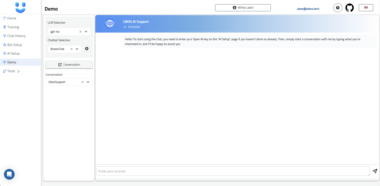 attestable-mcp-server
attestable-mcp-server
Overview
This project contains an MCP Server that is remotely attestable by MCP clients. To achieve this, a trusted execution environment is used, which generates a certificate representing the currently-running code of the attestable-mcp-server. The attestable-mcp-server sends this certificate in the TLS handshake to an MCP client before connecting that proves the code it's running is the same code built on github actions, and can be independently validated by building and running the code locally on emulated hardware or secure hardware; these values will be the same. The protocol used for client <-> server remote attestation is RA-TLS, an extension to TLS that adds machine and code specific measurements that can be verified by an MCP client.
The most important concept behind this RA-TLS certificate is that it embeds an SGX quote in the standardized X.509 extension field with the TCG DICE "tagged evidence" OID, which in turn embeds the SGX report and the complete Intel SGX certificate chain. In addition to the SGX quote, the certificate also contains the evidence claims, with the most important one being the "pubkey-hash" claim that contains the hash of the ephemeral public key (in DER format) generated by the TEE of the memory image of the running MCP server.
Features
- MCP Clients can remotely attest the code running on any MCP Server
- MCP Servers can optionally remotely attest MCP Clients
Producing Signed Artifacts
The github action script in this repo runs on a self-hosted github runner inside of a trusted execution environment (TEE). The action script will build a docker container containing the attestable-mcp-server and generate a signed attestation of the code running inside the TEE. This docker image is then signed by github. You can independently generate the same values with or without secure hardware, and query our running server and get the same values.
Dependencies
- Intel SGX Hardware
- Gramine
- python 3.13
- Ubuntu 22.04
- Intel SGX SDK & PSW
Quickstart
uv sync
docker build -t attestable-mcp-server .
gramine-sgx-gen-private-key
git clone https://github.com/gramineproject/gsc docker/gsc
cd docker/gsc
uv run ./gsc build-gramine --rm --no-cache -c ../gramine_base.config.yaml gramine_base
uv run ./gsc build -c ../attestable-mcp-server.config.yaml --rm attestable-mcp-server ../attestable-mcp-server.manifest
uv run ./gsc sign-image -c ../attestable-mcp-server.config.yaml attestable-mcp-server "$HOME"/.config/gramine/enclave-key.pem
uv run ./gsc info-image gsc-attestable-mcp-server
Starting Server on Secure Hardware
docker run -itp --device=/dev/sgx_provision:/dev/sgx/provision --device=/dev/sgx_enclave:/dev/sgx/enclave -v /var/run/aesmd/aesm.socket:/var/run/aesmd/aesm.socket -p 8000:8000 --rm gsc-attestable-mcp-server
Starting Server on local development machine
docker run -p 8000:8000 --rm gsc-attestable-mcp-server
TODO
- add MCP client demonstrating ra-tls
- add intel-signed measurements from our github action to this readme for simple independent verification
Future Plans
- JSON Web Key (JWK) attestation claim validation
cobrowser.xyz
Remotely Attestable MCP Server
Project Details
- co-browser/attestable-mcp-server
- Last Updated: 4/11/2025
Recomended MCP Servers
MCP server that creates its own tools as needed
Allow MCP clients like claude-desktop to use rooms to coordinate with other agents

MCP Server for Shopify API
openai websearch tool as mcp server

中国传统黄历 MCP 服务 | Chinese Traditional Almanac MCP Service
This is an MCP (Model Context Protocol) server for interacting with Google's Chronicle Security Operations API.

An MCP server for OBS
mcp-1panel is an implementation of the Model Context Protocol (MCP) server for 1Panel.
Ethereum Tools for Claude - A comprehensive blockchain analysis toolkit that enables Claude AI to audit smart contracts,...
Query MCP enables end-to-end management of Supabase via chat interface: read & write query executions, management API support,...

Securely run AI-generated code in stateful sandboxes that run forever.
ClickUp MCP Server - Integrate ClickUp task management with AI through Model Context Protocol
 From vibe coding to vibe deployment. UBOS MCP turns ideas into infra with one message.
From vibe coding to vibe deployment. UBOS MCP turns ideas into infra with one message.






